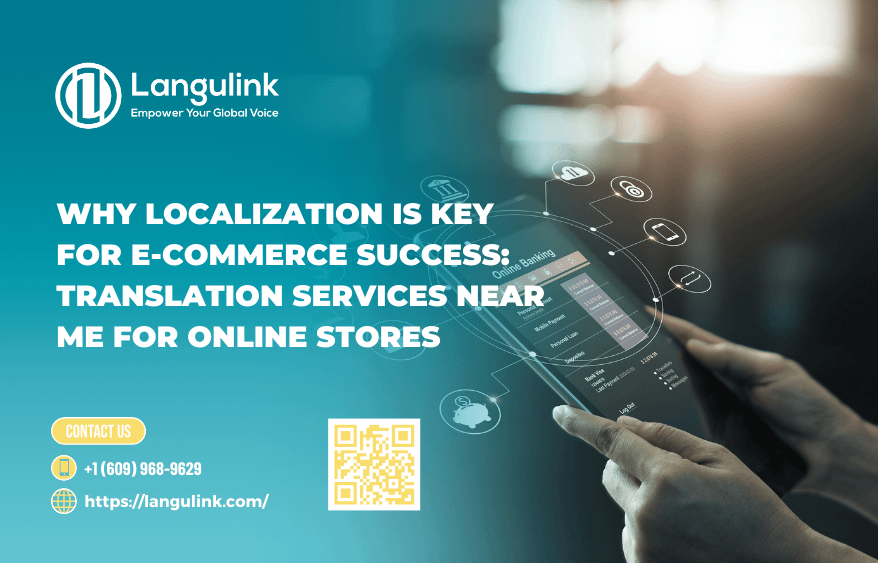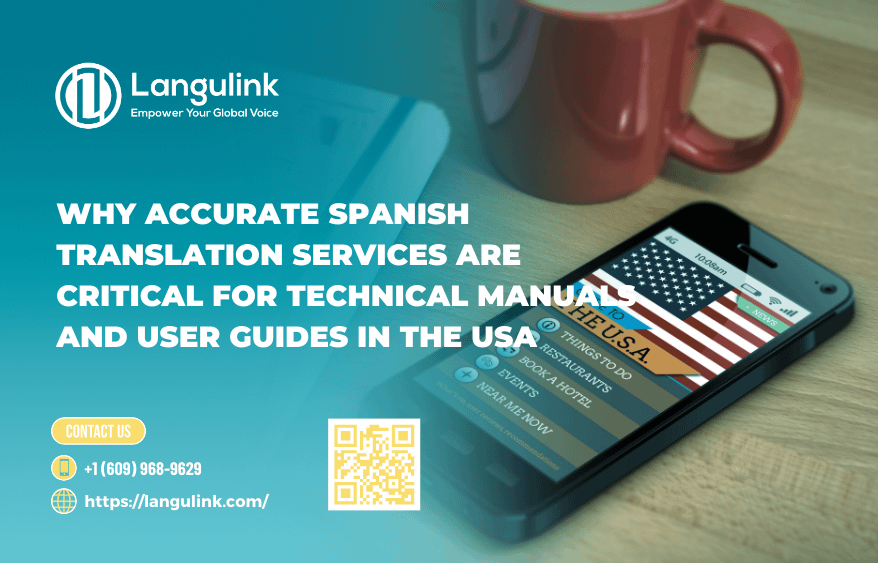Table of Contents
Telehealth and Interpreter Services for Healthcare: A Game-Changer for Remote Patients
In today’s fast-paced digital world, telehealth has revolutionized the healthcare industry, making medical services more accessible to patients regardless of their location. However, for individuals with limited English proficiency (LEP), language barriers remain a significant challenge. This is where interpreter services for healthcare play a crucial role.
By integrating professional medical interpretation with telehealth, healthcare providers can ensure that every patient receives accurate and effective communication, leading to better health outcomes.
In this article, we will explore the importance of telehealth and interpreter services, how they enhance patient care, and why healthcare providers should partner with a reliable translation agency like Langulink to ensure seamless communication.
The Rise of Telehealth in Modern Healthcare
Telehealth has become a cornerstone of modern medicine, particularly after the COVID-19 pandemic accelerated its adoption. This innovative approach allows patients to consult with healthcare professionals remotely, eliminating the need for physical visits.
Benefits of Telehealth for Patients and Providers
- Convenience and Accessibility: Patients can receive medical care from the comfort of their homes, reducing travel time and associated costs.
- Improved Patient Engagement: Telehealth encourages patients to take an active role in their healthcare by providing easy access to medical professionals.
- Reduced Healthcare Costs: Virtual consultations minimize hospital visits, lowering overall medical expenses.
- Enhanced Chronic Disease Management: Patients with chronic conditions can regularly check in with their doctors without frequent hospital visits.
Despite these advantages, language barriers can hinder the effectiveness of telehealth, making interpreter services for healthcare essential.
The Role of Interpreter Services in Telehealth
Effective communication is the foundation of quality healthcare. When patients and healthcare providers do not speak the same language, misunderstandings can lead to misdiagnoses, improper treatments, and poor patient outcomes.
How Interpreter Services Improve Telehealth Consultations
- Accurate Medical Communication: Professional medical interpreters ensure that patients fully understand their diagnosis, treatment plans, and medication instructions.
- Cultural Sensitivity: Trained interpreters are aware of cultural nuances, ensuring respectful and effective communication.
- Compliance with Healthcare Regulations: Many healthcare institutions are required by law to provide language access services to LEP patients.
- Increased Patient Satisfaction: Patients feel more comfortable and confident when they can communicate in their preferred language.
By integrating interpreter services for healthcare into telehealth platforms, medical providers can bridge the language gap and deliver equitable healthcare services.
Types of Interpreter Services for Healthcare
There are several types of medical interpretation services available, each suited for different healthcare settings.
1. On-Demand Video Remote Interpreting (VRI)
- Provides real-time interpretation through video calls.
- Ideal for telehealth consultations, emergency situations, and specialist appointments.
2. Over-the-Phone Interpretation (OPI)
- Offers immediate access to interpreters via phone calls.
- Useful for quick consultations and follow-up appointments.
3. In-Person Interpretation
- Best for complex medical procedures and sensitive discussions.
- Ensures direct communication between patients and healthcare providers.
4. Sign Language Interpretation
- Essential for patients with hearing impairments.
- Can be provided through video or in-person services.
Choosing the Right Interpreter Services for Healthcare
Selecting the right medical interpretation service is crucial for ensuring seamless communication. Here are some factors to consider:
- Certification and Training: Ensure that interpreters are certified and trained in medical terminology.
- Availability: Choose a service that offers 24/7 support for emergency situations.
- Technology Integration: Opt for services that can be easily integrated into telehealth platforms.
- Confidentiality Compliance: Ensure that interpreters adhere to HIPAA regulations to protect patient privacy.
Langulink: Your Trusted Partner for Professional Interpreter Services
When it comes to reliable and professional interpreter services for healthcare, Langulink stands out as a leading online translation agency in the USA.
With a team of highly skilled medical interpreters, Langulink ensures that healthcare providers can communicate effectively with patients from diverse linguistic backgrounds.
Why Choose Langulink?
- Expert Medical Interpreters: Certified professionals with extensive experience in healthcare settings.
- 24/7 Availability: On-demand interpretation services for urgent medical needs.
- Seamless Telehealth Integration: Compatible with various telehealth platforms for smooth communication.
- Strict Confidentiality: Compliance with HIPAA and other healthcare regulations.
- Multilingual Support: Interpretation services available in multiple languages to cater to diverse patient needs.
In legal proceedings, every word matters. A single misinterpretation can impact the outcome of a case. Discover how legal translation and telephone interpreter services ensure precision, clarity, and justice in court.
How to Integrate Interpreter Services into Telehealth Platforms
Healthcare providers can enhance their telehealth services by integrating medical interpretation solutions. Here’s how:
- Partner with a Professional Translation Agency: Work with a trusted provider like Langulink to access expert interpreters.
- Utilize Video Remote Interpreting (VRI): Ensure that telehealth platforms support video interpretation for real-time communication.
- Train Healthcare Staff: Educate medical professionals on how to effectively use interpreter services.
- Ensure Compliance with Regulations: Follow legal requirements for language access in healthcare settings.
- Monitor and Improve Services: Collect patient feedback to enhance interpretation quality and accessibility.
Enhancing Patient Trust and Compliance Through Professional Interpreter Services
- Building Patient Confidence: When patients can communicate in their native language, they feel more understood and respected. This fosters trust between healthcare providers and patients, leading to better cooperation and adherence to medical advice.
- Reducing Medical Errors: Miscommunication in healthcare can lead to serious consequences, including incorrect diagnoses and improper treatments. Professional medical interpreters ensure that every detail is accurately conveyed, significantly reducing the risk of errors.
- Improving Health Literacy: Many patients struggle to understand complex medical terms, especially when they are not in their first language. Interpreter services for healthcare help bridge this gap by simplifying medical jargon and ensuring patients fully comprehend their conditions and treatment plans.
- Enhancing Emergency Care: In urgent medical situations, clear and immediate communication is critical. With on-demand interpreter services, healthcare providers can quickly connect with professional interpreters, ensuring that life-saving information is accurately conveyed without delays.
- Strengthening Doctor-Patient Relationships: Effective communication fosters a positive rapport between doctors and patients, leading to better long-term healthcare management and improved patient satisfaction.
Boosting Healthcare Efficiency with Seamless Language Access Solutions
- Reducing Appointment No-Shows: Patients who struggle with language barriers may avoid medical visits due to fear of miscommunication. By offering multilingual interpreter services, healthcare providers can encourage patients to attend their appointments and seek timely medical care.
- Enhancing Workflow Efficiency: Medical staff often spend extra time trying to communicate with LEP patients without professional interpreters. By integrating medical interpretation services, healthcare facilities can streamline consultations, reducing delays and improving overall efficiency.
- Supporting Multicultural Communities: The USA is home to diverse linguistic communities, and healthcare providers must cater to patients from various backgrounds. Professional translation agencies like Langulink offer customized solutions to ensure inclusivity in medical care.
- Ensuring Legal and Ethical Compliance: Many healthcare regulations, such as Title VI of the Civil Rights Act, mandate language access services for LEP patients. Partnering with a trusted translation agency ensures compliance with these laws, protecting healthcare institutions from legal risks.
- Facilitating Telemedicine Expansion: As telehealth continues to grow, integrating interpreter services for healthcare ensures that language barriers do not hinder virtual consultations. This expands the reach of telemedicine, allowing more patients to access quality healthcare regardless of their linguistic background.
By leveraging professional interpreter services, healthcare providers can enhance patient care, improve operational efficiency, and ensure compliance with language access regulations. Langulink remains a top choice for seamless medical interpretation solutions, helping healthcare institutions deliver equitable and effective care to all patients.
The Future of Telehealth and Interpreter Services
As technology continues to evolve, the demand for medical interpretation services in telehealth will only increase. Advancements in translation tools, real-time speech recognition, and multilingual telehealth platforms will further enhance accessibility and efficiency.
Healthcare providers must stay ahead by adopting innovative solutions and partnering with reputable translation agencies like Langulink to ensure high-quality patient care.
Break Language Barriers with Langulink’s Interpreter Services for Healthcare
Language should never be a barrier to quality healthcare. With Langulink’s expert interpreter services for healthcare, you can provide seamless communication for your patients, ensuring accurate diagnoses and effective treatments.
Contact Us today to learn more about our professional medical interpretation services and take your telehealth consultations to the next level!
Frequently Asked Questions (FAQs)
1. Why are interpreter services essential for telehealth?
Interpreter services ensure that patients with limited English proficiency can communicate effectively with healthcare providers, leading to accurate diagnoses and better treatment outcomes.
2. How do video remote interpreting (VRI) services work in telehealth?
VRI allows patients and doctors to connect with a professional interpreter via a video call, ensuring real-time communication and eliminating language barriers.
3. What languages are available for medical interpretation services?
Professional medical interpretation services cover a wide range of languages, including Spanish, Mandarin, Arabic, French, and many more. Langulink offers multilingual support to cater to diverse patient needs.
4. Are interpreter services HIPAA-compliant?
Yes, professional medical interpreters follow strict confidentiality guidelines and comply with HIPAA regulations to protect patient privacy.
5. How can healthcare providers integrate interpreter services into their telehealth platforms?
Healthcare providers can partner with a trusted translation agency like Langulink, use video remote interpreting (VRI) solutions, and train staff on best practices for working with interpreters.
Conclusion
The combination of telehealth and interpreter services for healthcare is transforming the medical industry, making healthcare more accessible and inclusive. By eliminating language barriers, healthcare providers can ensure that every patient receives the care they deserve.
Partnering with a reputable translation agency like Langulink guarantees high-quality medical interpretation services, ensuring seamless communication and improved patient satisfaction.
Embrace the future of healthcare today—integrate professional interpreter services into your telehealth platform and provide equitable care for all patients!



